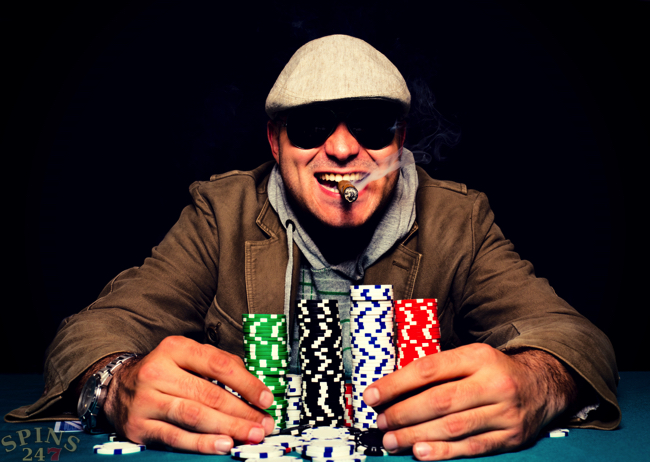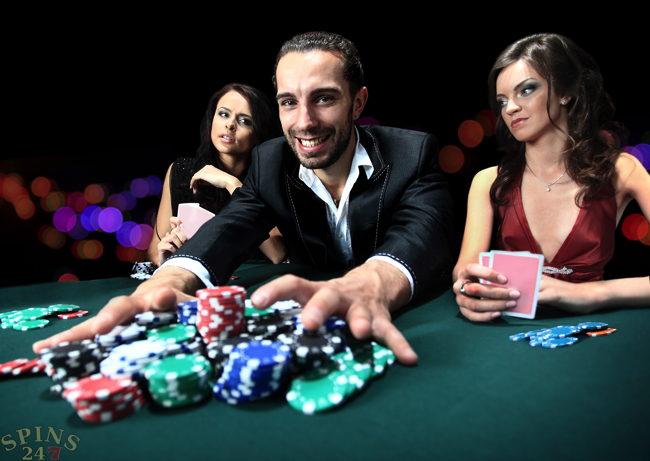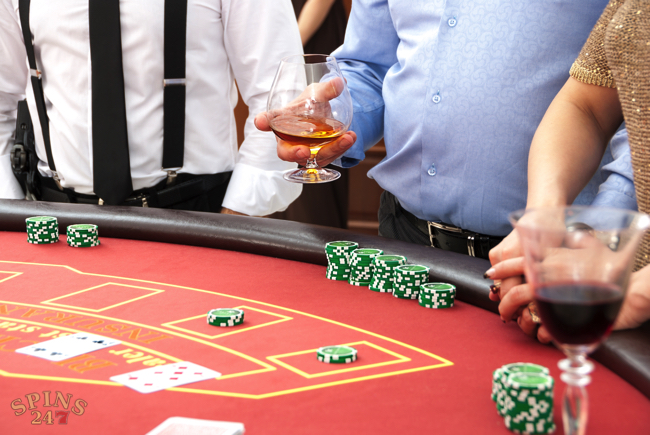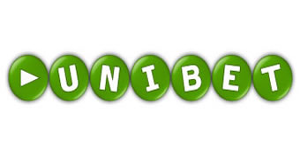The Seven Deadly Sins of Blackjack
Blackjack is a game of luck, discipline and memory. Luckily the memory aspect can be removed with online Blackjack, making it possible for you to win even if you’re not Rain Man. That leaves discipline and luck, and by applying large dozes of the discipline element you have the possibility of largely superseding the element of luck.
To paint a picture I will use the Seven Deadly Sins. Pay attention, because I will touch base with the most important lessons of Blackjack. It also falls natural to discuss responsible gambling in this article.

Wrath. As with gambling in general, do not play Blackjack when you are emotionally unbalanced. Responsiblegambling.org writes: “It is hard to make good decisions about gambling when you are feeling down.” It is hard not to agree with this.
Greed. Gambling and greed goes hand in hand with bankroll management. Or like your grandma used to tell you: Don’t spend it all at once. Just because you are winning, it doesn’t mean you should recklessly increase the stakes. But if you are winning you should increase the stakes. I would recommend something called 1-2-3-4 progression or 50% progression. With 1-2-3-4 progression you increase the number of units per bet every time you win. So if you are betting €10 and win, you bet €20. If you win again, bet €30, and so on. If you lose, you go back to the initial stake. If you are following the 50% progression strategy you increase your bet with 50% every time you win. If you lose, return to the initial stake.
Bottom line: It’s OK to be little greedy when you are winning.
Sloth. In short, this sin can be described as failure to utilize one’s talents and gifts. When related to Blackjack this means counting cards if you are up for it. It can most definitely be described as a talent, and not everyone can do it even if it’s of course easier with an online casino. You can read more about Blackjack and card counting here. Also, if you get a gift of two picture cards or tens, you should never split; even of the dealer has an ace.
The rules of responsible gambling say you should balance gambling with other activities so that gambling does not become too big a part of your life. So don’t sit in front of the computer all day, go on outside and enjoy your skills and favorite activities.
Pride. If you’re losing, don’t be proud and gamble away the remainders of your bankroll. You should always walk away from a Blackjack table if luck is against you.
Lust. No matter how keen you are on winning back what you have lost, you should never chase losses by going over your limit. This usually leads to even bigger losses.
Envy. Never mind if the rich business next to you is betting three times as much as you each round. He will go broke before you. Stick to your game plan.
Gluttony. You probably remember the scene from Seven with the fat man who was force fed until he burst? He was being punished for gluttony, the over-indulgence and over-consumption of anything to the point of waste. So if you win, spend your money wisely.
Before we go on to find the Reversed House Edge there is one more deadly sin in Blackjack: To buy insurance. Constantly buying insurance at Blackjack tables will kill your bankroll, no doubt. So NEVER buy Blackjack insurance. Remember, the insurance salesman keeps us poor all our lives so we can die rich.

Finding the Reversed House Edge in Blakjack
We will discuss Blackjack strategy later in this article (it’s simple, you only need a chart), but since Blackjack strategy depends on the table you are playing at, let’s locate the tables with the best odds first.
We found this table on wizardofodds.com which is a thorough and systematic overview of how the different house rules affect your odds when playing Blackjack. Look for tables with those rules that have positive percentage.
Also well worth noticing is that the fewer decks of cards are used in play, the lesser the house advantage:
Blackjack is the most popular casino game in the world. Consequently, most casinos are offering loads of different variants. For instance take a look at the different Blackjack games offered by Betway which happens to be one of my favorite casinos:
- Atlantic City Blackjack
- Atlantic City Gold Blackjack
- Atlantic City Gold Multi-hand Blackjack
- Blackjack
- Classic Blackjack Gold
- Classic Blackjack Multi-hand
- Double Exposure Blackjack
- European Blackjack
- European Blackjack Gold
- High Limit European Blackjack
- Spanish Blackjack
- Super Fun 21 Blackjack
- Vegas Downtown Blackjack
- Vegas Strip Blackjack
Combined with a £1000 Betway match bonus you are looking at good odds. The same goes at casinos like Spin Palace (€1000), Roxy Palace (€100), InterCasino (€250), Bet 24 (€100) and Ladbrokes (€100). But in order to keep the odds good, you need to know how to play 100% correct Blackjack.
The answer to every difficult Blackjack decision
In the example below you can see what your decision should be for every possible scenario when playing single deck Blackjack where the dealer draws on soft 17. See under the table for explanations.
h: Hit.
s: Stand.
d: Double if allowed. Hit if not.
ds: Double if allowed. Stand if not.
p: Split.
h/p: Split if doubling after split allowed. Hit if not.
d/p: Split if doubling allowed after split. Double if not.
s/p: Split if doubling allowed after split. Stand if not.
h/r: Surrender if allowed. Split if not.
s/r: Surrender if allowed. Stand if not.
p/h: Split if allowed. Hit if not.

The history of blackjack
What is the history of blackjack? It is generally accepted that Blackjack originated in France – it grew out of games like “Chemin de Fer” and became popular in casinos in the 1700s. In French, it is called “Vingt-et-Un” which means “Twenty-and-one”.
The French colonists brought the game to North America, and spread it all over the continent.
In the history of blackjack, it was still known as ‘21’ when Nevada made gambling legal for the first time in 1931. To attract more customers, some of the casinos offered a special bet which paid 10 to 1 to the player if he got specific first two cards. This bet has since been discontinued, but the name has persisted.
A new chapter was added to the history of blackjack in the 1950s and 1960s. Mathematical information was published that showed gamblers how they could play so that they were nearly even with the house and obtain a slight edge. One of these books became immensely popular and even got into the New York Times’ bestseller list. The information sparked immense public interest and made Blackjack the topmost table game in the US in the 1960s, and the casinos made huge profits.
But the casinos were not happy with the success of the book. They tried changing the rules of blackjack to make winning more difficult. This didn’t last very long – the public protested and refused to play the new version of blackjack. This resulted in loss of revenue, which quickly forced the casinos to go back to the old rules.
Ultimately, the casinos did make changes to increase their odds, which succeeded in restoring their edge.
Card counting - 21 / blackjack
The basic rule in card counting is that a pack of cards, which has a high fraction of high cards as compared to low cards, is excellent for the gambler, and the reverse of this principle is appropriate for the dealer. A pack, which is rich in aces and tens, will improve the player’s odds because they are likely to be more widespread, the dealer can more easily bust a tough hand, and the double-downs are likely to be more successful.
When card counters find that the proportion of high end pack cards to lower end pack cards in their deck is in their support, they hike their bets. They also adjust their strategy based on this ratio. They make these adjustments in their playing and betting strategy, and this gives them and a lead in the house.
People wrongly believe in the myth (reinforced by the blockbuster Rain Man) extraordinary qualities are needed for card counting to be able to tally cards. In reality, they do not track and memorize specific cards; rather, card counters allocate points and track the entire score.
Blackjack Strategy and Blackjack Rules
In blackjack it’s about getting as close to 21 as possible. The one closest to 21 wins the hand. If dealer or player hits over 21 the opposite wins. Cards from 2-9 counts as their nominal value, 10 and face cards as 10 and the ace as 1 or 11.
There are no limit to the amount of cards the player can receive as long as the value isn’t higher than 21. The casino on the other hand must draw at 16 or under and stand at 17 or over.
BLACKJACK OPTIONS | |
|---|---|
| Hit | You receive one more card. After that it’s only possible to hit or stand. |
| Stand | You won’t receive any more cards and so the dealer draws. |
| Double Down | You choose to double your stake and you will receive one more card. |
| Split | If you get two of a kind, you choose to split them and double your stake. |
| Insurance | If the dealer’s first card is an ace you can buy insurance. |
| Blackjack | If you get 10 or a face card and an ace you get the highest value possible. |
| Hard / Soft | Example of hard/soft: Ace + 6 is hard 7 or soft 17. |
| Bust | If you get over 21 you lose. So does the dealer. |






